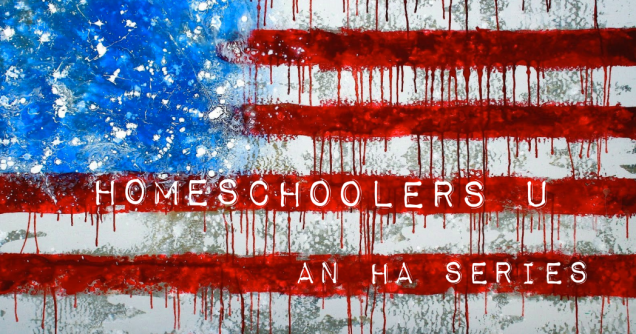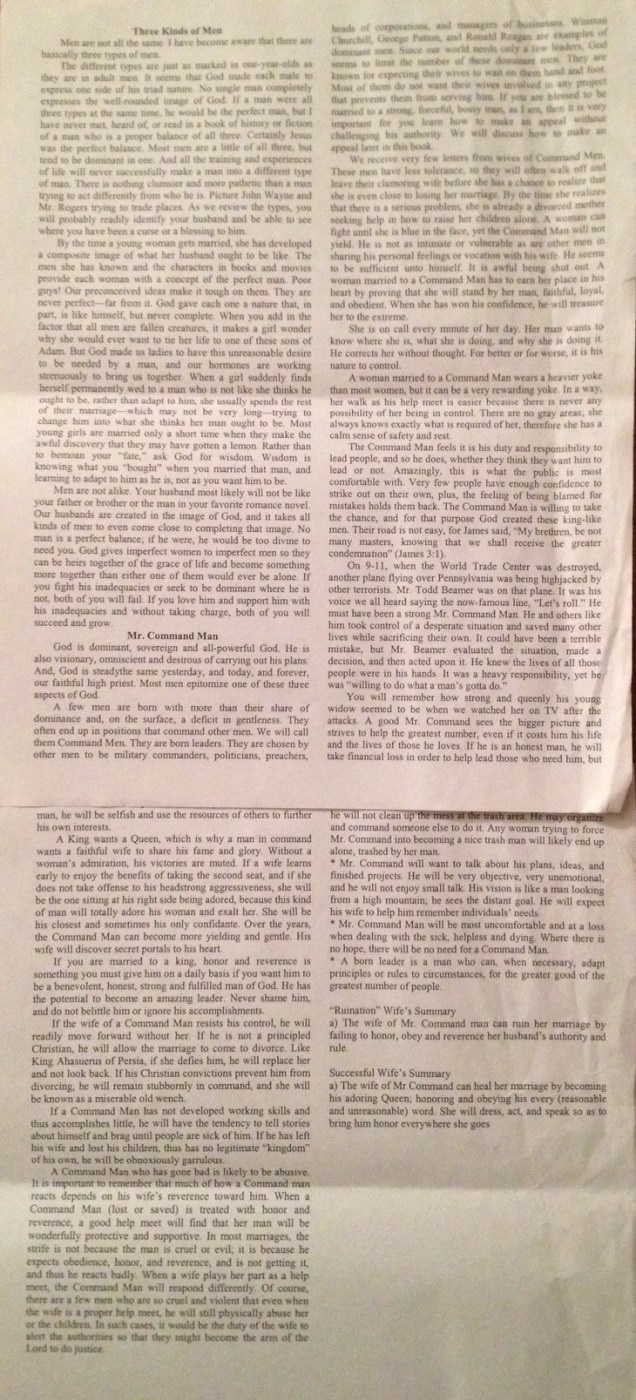HA note: The author’s name has been changed to ensure anonymity. “Gemma” is a pseudonym specifically chosen by the author.
< Part Six
Part Seven: Aftermath
On paper, my post-PHC life has been quite successful.
As it turns out, I do have a future in academia. I was accepted to an excellent graduate program in the DC area. I teach at the collegiate level, and I’m good at it. I am still a Christian, mostly due to the fact that I had some experience with the type of Christianity that loves and accepts and forgives before coming to college. I recognized the “Christianity” used to hurt me there as a bastardization of the real thing. Today, I am happily married and still run with the same group of friends I had in college. The future looks bright.
Spiritually, my post-PHC life has been a mixed bag. On one hand, the spiritual abuse my friends and I encountered at school poisoned entire swaths of the normal Christian life for us. Things as simple as prayer and reading the Bible trigger either bad memories or massive amounts of legalism-induced guilt. For me, just hearing one of the praise songs we used to sing in chapel at college would be enough to induce a panic attack. Many of my friends left the faith altogether, and I don’t blame them. Those of us who stayed Christians found homes in various liturgical traditions. On the other hand, the process of sorting through my faith and wrestling with what to keep and what to discard has been enormously rewarding. It is difficult to admit to myself that I just don’t know what I believe anymore, and to try to re-explain the tenets of the faith to myself in words that are meaningful to me now. But I have discovered that Jesus is big enough to handle my doubts, and he seems to be the one constant at the bottom of all my confusion and grief. Today, I am a better Christian than I ever have been, but it has taken years of struggle to come to this place.
Ironically, had it not been for Mike Farris and his college, I would probably still be a conservative evangelical, attending a Bible Church and homeschooling my kids. I would never have had a reason to leave the world I grew up in, because it was a world I didn’t want to leave in the first place.
Their abuse is the only thing that drove me away.
But in other ways directly attributable to my time at PHC, life has been a massive struggle. I graduated a broken, burnt-out shell of a person and spent the first several years after graduation in a haze of grief, anger, and depression. I lost weight. I slept all the time. I had panic attacks daily. Some days, I felt so physically sick—dizzy, nauseous, exhausted—I couldn’t even get out of bed. I skipped class a lot. Even though I was out from under the oppression, I couldn’t shake the sense that I was being watched wherever I went. It didn’t help that I would randomly run into people I didn’t want to see, since I still lived in the DC area. I lived in paranoid and baseless fear that my new university would find something wrong with me, that I would unwittingly break some rule and be found out, or that they would realize they had made a mistake by accepting my unaccredited undergraduate degree and kick me out. I was afraid to speak up in class, so I didn’t. Academically, I was extremely well-prepared for graduate school, but my exhaustion, depression, and anxiety prevented me from getting the most out of my program.
It also didn’t help that PHC continued to abuse its remaining students, many of whom had taken up the fight and kept me abreast of the issues. I fought with them for a while, via the alumni association, interviews with reporters, or maintaining protest websites. Over time, as more of my friends graduated or left, I just dissociated from the entire place as much as I could.
But the dissociation didn’t cure the emotional and spiritual wounds. At the time, I didn’t have much of an understanding of mental health, and attributed my problems to a set of inexplicable, incorrigible physical symptoms. In retrospect, it is obvious that I was deeply depressed and also struggling with severe anxiety. My therapist has compared my symptoms to PTSD, a common description for those who have experienced environments of intense spiritual and emotional abuse. These things don’t heal overnight.
I believe the abuse I experienced at PHC robbed me of my health and happiness in the prime of my life.
I spent 10 years crushed by the weight of broken health, a broken spirit, a broken heart. I didn’t want to live like this. It wasn’t my choice. I wasn’t wallowing in bitterness or being hard-hearted or refusing to trust God enough. After a while, the school wasn’t even on my radar anymore, but the feelings stayed. I think when you spend enough time feeling a certain way, those feelings just start to feel so normal you stop imagining life without them, and then one day you can’t imagine life any other way at all.
Now on the verge of my 4th decade, I’ve finally gotten myself the professional help I needed for so long. Reading people’s stories on HA has helped in the sense that I can see now that I am not alone. But it has also brought up a lot of strong feelings I thought had gone away. Writing this story was very hard, but I thought it was important to do for a few reasons:
First, I want there to be a record of the truth. I want people to know that some of us stood up for what was right and against what was wrong. I want people to know that serious wrong was done to us, and we tried to respond in the right way. I am proud of myself and my friends for the way we handled ourselves. Although no one should have to endure what we endured at college, I am glad that I had an opportunity to stand up for something I believed in, at significant personal risk. I am glad that when I had a chance to be courageous, I took it. Not everyone gets those opportunities in life, and not all of those who get them, take them. We did.
Secondly, I want people to know what PHC is really about. I can’t tell you how many times, even while I was still a student, I would have settled for the school just admitting the truth about itself, even if that meant I had to live with that truth forever. Patrick Henry College is not a normal, mainstream, classical-liberal-arts college. It is not regionally accredited and apparently never will be, despite what we early students were promised when we enrolled.
Patrick Henry College is a sheltered, religiously fundamentalist, agenda-driven institution; a side project of HSLDA like Oak Brook is a side project of ATI/IBLP.
Its purpose is not to give students a quality collegiate education on which to base their own dreams and plans for the future, but to indoctrinate students into the mindset of its founders and leaders, so they can be deployed into positions of power and thereby further the political and social agenda of those leaders.
I am not exaggerating. This is the truth.
In order to fulfill this agenda and succeed in getting people into power, the college wants to maintain its veneer of respectability and normality. But it is just a veneer. Once upon a time, some professors and students fought with all our strength to make the veneer into a solid reality, but we were kicked to the curb by those in power. That ship has sailed. The only thing left to do now is peel back the veneer and expose the underlying reality.
Finally, I want others to know that they are not alone. Recently I saw that students at Bryan College were going through a similar struggle. I hope they know they have support, and that what they are doing is courageous and important.
As long as my story has been, I have not included every significant thing that happened while I was at PHC.
I have not even included the worst things. There are some stories that, even now, a decade or more later, are too painful to write about.
Some events included other people, whose stories I don’t want to tell for them. And I have left out many of the weekly and daily occurrences that, individually, were just straws, but over time accumulated into an unbearable, back-breaking mountain. The little comments made in chapel or in the lunch line; the judgmental, preachy emails sent to all-students by self-appointed morality police; the new rule adjustments, interpretations, or applications that dribbled out from the Office of Student Life. All reminders of the invisible standard we non-conformists were not conforming to. All reminders of who was in charge, and who was watching, and how we could never live up. A thousand little discouragements. They add up after a while, but there are too many to remember.
I hold no grudges against my fellow students. Thanks to the work of people at Homeschoolers Anonymous and Recovering Grace, I now have the perspective to see that those of my fellow students who made my life so unhappy were unhappy themselves. They were not actually evil sadists, but victims of a sadistic system. They didn’t know any better. Many of them have changed. Their stories, like mine, are not over yet. My hope, for all of them, friends and foes alike, is that they will find some peace on their journeys after all.
Honestly, I have had a harder time forgiving the adults in charge at PHC, mostly because they have refused even to entertain the idea that they might have been at fault for some of what happened, and that they, personally, might have hurt students and alumni along the way. Recently, it seems that Mike Farris is in more of an apologetic mood. As I can personally attest, the skeletons that have come out of the fundamentalist homeschooling movement’s closet in the last year have prompted a lot of reconsideration and reflection. I hope he will come to see the recent stories in the press and the blogosphere not as an attack to be countered, but as an opportunity to acknowledge the truth. Truth is important. Without truth, real reconciliation is impossible. I believe that God’s work in the world is toward the redemption and reconciliation of all things. I stand on the side of truth and redemption—not bitterness, not cheap grace, but the kind of real love and reconciliation that can encompass the ugliest truth.
I will end by saying that I recognize there are many former students whose experience was not like mine. Some students seemed to get along just great with the administration. Of those, not all were abusive and spiteful—many were kind, compassionate, genuine human beings with whom I simply disagreed on some issues. Other students kept their heads down and their opinions to themselves, and escaped relatively unscathed. Even others seemed to let the BS wash off them like ducks—it was just a place they went to college, and their real life was somehow elsewhere. I recognize the fact that other people experienced PHC very differently than I did.
I hope that those who disagreed with me (then or now) can extend the same courtesy, and acknowledge that just because my experience may have been different than theirs, does not mean that I am wrong and need to be silenced.
End of series.



